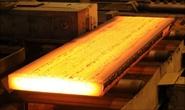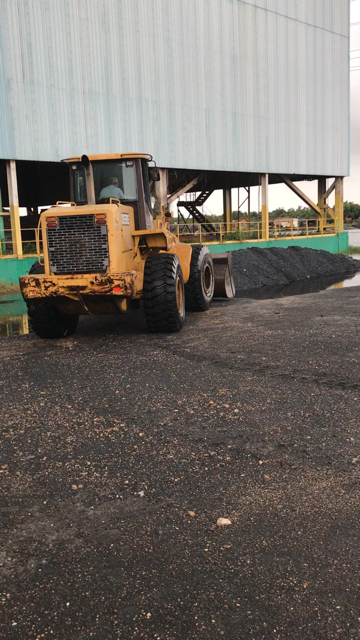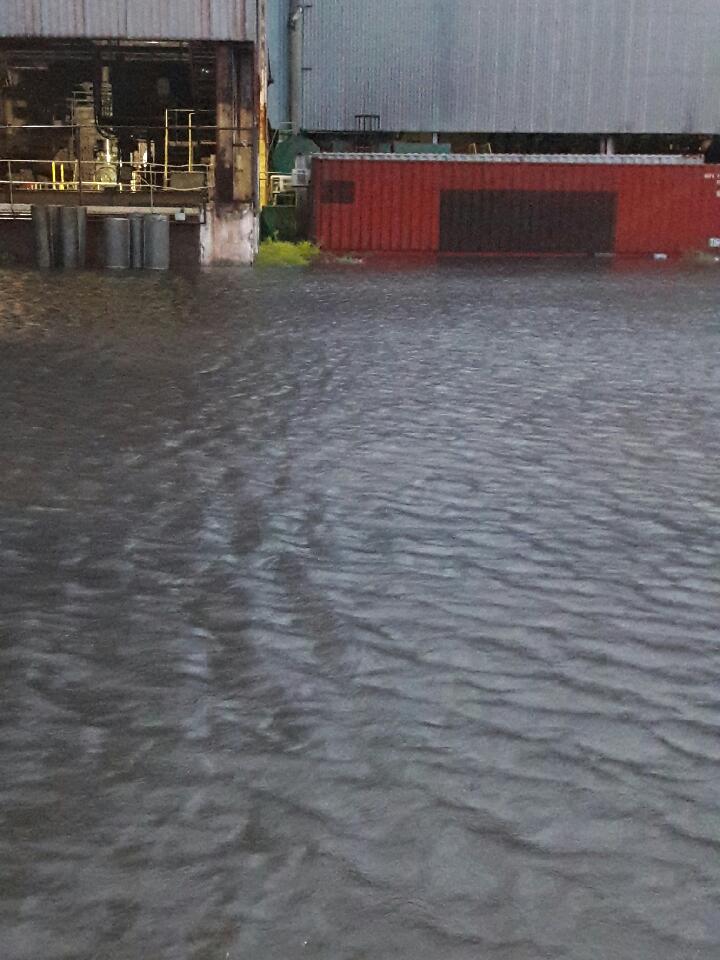Prices

September 14, 2017
JSW Perseveres Through Storm, Looks to Future
Written by Sandy Williams
JSW Steel, a steel plate mill in Baytown, Texas, reports a remarkable story of perseverance, ingenuity and courage as it faced the devastation of Hurricane Harvey.
As the hurricane was bearing down on the coast, CEO John Hritz made the difficult decision to shut down operations at the mill. JSW’s 700 acres are situated in the bayou area of Baytown, an area that can’t withstand the type of downpour that Harvey was expected to bring. Employees were sent home to prepare personally for what was coming. “No one really anticipated the magnitude,” said Hritz. “In hindsight, we did the right thing.”
 Twelve volunteers led by Director of Facilities Gary Baggett, a 30-year veteran at Shell, hunkered down in the plant to orchestrate an orderly shutdown of equipment. The steel mill has as much going on underground as above with massive hydraulic and electromechanical systems in the basement generating 2,000 hp that were especially vulnerable to flooding. As the shutdown progressed, the rain came, all 48 inches of it. As water began pouring into the basement area, someone suggested using the slag piled up outside to make dams and berms to protect the facility. Slag, metal waste created in the steel manufacturing process, was placed systematically around the structure to stem the inflow of water. Braving winds, rain and two tornadoes that passed over their heads, the volunteers turned the ingenious idea into substance, saving the mill from disastrous flooding. Hritz said the employees’ courageous actions prevented horrific damage that could have prevented the mill from coming back to operation once the storm was over.
Twelve volunteers led by Director of Facilities Gary Baggett, a 30-year veteran at Shell, hunkered down in the plant to orchestrate an orderly shutdown of equipment. The steel mill has as much going on underground as above with massive hydraulic and electromechanical systems in the basement generating 2,000 hp that were especially vulnerable to flooding. As the shutdown progressed, the rain came, all 48 inches of it. As water began pouring into the basement area, someone suggested using the slag piled up outside to make dams and berms to protect the facility. Slag, metal waste created in the steel manufacturing process, was placed systematically around the structure to stem the inflow of water. Braving winds, rain and two tornadoes that passed over their heads, the volunteers turned the ingenious idea into substance, saving the mill from disastrous flooding. Hritz said the employees’ courageous actions prevented horrific damage that could have prevented the mill from coming back to operation once the storm was over.
JSW Steel was fortunate that it never lost electricity during the storm and was able to begin shipping substantial volumes again on Sept. 5. The plate mill and a portion of the pipe mill were operational on Sept. 6. Employees were able to return to work, generating income and regaining a sense of normalcy. The company stepped up to help employees with FEMA issues and began a fund to help those who were hit hardest by the storm.
Hritz said the company’s order book appears firm and he does not believe the mill has lost any orders due to customer difficulties. JSW ships its products by truck, train and barge.
Optimism Prevails
JSW Steel was originally a U.S. Steel company that was built in the late 1960s and early ’70s to provide pipe for the Alaskan pipeline. Hritz’s career is a storied one, beginning with an engineering background and a foray “into the dark side” to receive a law degree. He helped restructure Armco in 1989 and was there through the initial public offering in 1994 and transition to AK Steel. In 2015, Hritz was brought in to restructure JSW steel in Baytown, inheriting a pipe mill in fairly good shape, but a plate mill that needed “a lot of preventive maintenance and a whole new way of thinking and attention to detail.”
Since that time, the mill has made terrific strides in reducing OSHA-recordable rates, mill downtime and overall rejections, he said. The company is now looking forward to a new future with the addition of a hot end for the plate mill. An electric arc furnace and a “monster” large continuous caster will make JSW Steel a one-of-a-kind entity that can manufacture heavy plate, light gauge and pipe.
Currently, JSW imports slabs from Mexico, South America and occasionally from its parent company in India. “There is definitely a market for slabs in the U.S,” Hritz said. Addition of an electric arc furnace will give JSW the “melted in America” status that will allow its steel to be used in government projects.
Hritz said he laughed when he heard some were saying the U.S. cannot make all API grades, especially X70. JSW Steel produces X64 and X70 plate—actually about 700,000 tons a year of X70. The facility has a rated capacity of 1.2 million tons a year and can make plate from 0.250 inch to 6 inches thick and 150 inches wide. The continuous pipe mill makes 24- to 48-inch diameter pipe with longitudinal welding, opposed to spiral, that can be coated. The pipe is used by the energy sector for natural gas and oil transmission. Plate goes into wind towers and other industrial applications.
Hritz said he feels positive about the future of the energy sector and that is one of the reasons the company is moving forward on its plans for an EAF. JSW Steel has been asked to participate in dumping cases related to energy pipeline. Hritz is optimistic about where the administration is trying to go in rebuilding the steel industry, especially as it relates to infrastructure, defense and energy.
Conditions are going to get better, he said. “We are not just hoping, we are participating in it. Our project is massive and will be more ‘Star Wars-like’ than anything else in North America. We anticipate a strong future for this company.”
JSW Steel is in favor of the Section 232 action that is under consideration by the Commerce Department. Hritz thinks it’s “the right thing to do to help the country, manufacturing and certainly the steel industry.”
“I watched Youngstown steel jobs go away over time, and it’s time to reverse that trend in a big, big way. I think Section 232 is the way to do it.”
Written by Sandy Williams, Sandy@SteelMarketUpdate.com








